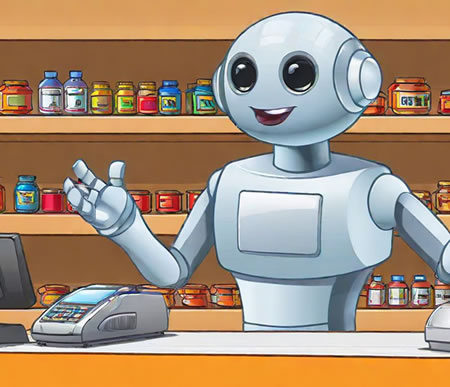AI in Small Business: The Future or a Digital Nightmare?

Right then, artificial intelligence.
The two most terrifying words in business today—unless, of course, you’re the one selling AI. We’re told it’s going to revolutionize everything, making businesses more efficient, customers happier, and life easier.
But let’s not kid ourselves—there’s a fair bit of nonsense attached to all this AI hype.
Yes, AI can be useful, and for small businesses, it might just be the thing that keeps them competitive. But it also comes with some serious headaches. So, let’s take a look at the good, the bad, and the downright idiotic parts of AI in small business.
AI: The Miracle Worker (Sometimes)
The best thing about AI? It can handle the boring stuff. No one starts a business because they love answering emails at 2 AM or manually updating stock levels. AI can automate the tedious, brain-meltingly dull parts of running a business, which means owners can spend more time doing what they actually enjoy.
- Chatbots & Virtual Assistants – Sick of answering the same customer questions over and over? AI chatbots will do it for you, meaning customers get instant responses without you having to lift a finger.
- Marketing on Autopilot – AI can send emails, post on social media, and even personalize website content so customers feel special—without you actually having to talk to them.
- Inventory Management – AI doesn’t forget to order stock. It can predict what’s going to sell and restock accordingly, reducing the chances of running out of your best-selling items.
Sounds brilliant, right? Well, hold your horses, because here come the problems…
When AI Goes Horribly, Horribly Wrong
AI isn’t perfect. In fact, sometimes it’s as useful as a chocolate teapot.
- Customer Service Disasters – AI chatbots are great until they aren’t. If you’ve ever tried explaining a slightly complicated issue to one, you know what I mean. The moment things go beyond “Where’s my order?” or “What are your opening hours?”, they crumble like an old biscuit. Customers get frustrated, and suddenly, your “efficiency” is costing you business.
- Privacy Nightmares – AI is hungry for data. It wants to know everything about your customers—where they live, what they buy, what kind of biscuits they prefer with their tea. But with great data collection comes great responsibility. Mess it up, and suddenly, you’re in a legal battle because your AI-powered website leaked customer details all over the internet.
- Integration Hell – AI might be clever, but it’s about as cooperative as a cat at bath time when it comes to integrating with existing systems. Small businesses often use older software, which AI tools don’t always play nicely with. You’ll spend more time trying to make it work than actually benefiting from it.
- The “We Don’t Need Humans” Fantasy – AI evangelists will tell you it can replace staff, cutting costs and increasing efficiency. What they fail to mention is that customers still want to deal with actual humans. If your AI-driven customer service makes people feel like they’re talking to a robotic void, they’ll simply take their business elsewhere.
AI in the Future: Opportunity or Disaster?
The reality is AI isn’t going anywhere. But rather than taking over completely, it’s going to create a weird hybrid business environment where some things run like clockwork, and others go completely off the rails.
- AI-Generated Content – It’s already writing page content, social media captions, and even customer emails. But let’s be honest—it still reads like something written by a particularly uninspired intern.
- Cybersecurity Risks – AI is great at automating things, but it also makes cybercriminals more powerful. Hackers can use AI to break into systems, steal data, and make your life a living nightmare.
- AI Bias and Stupidity – AI learns from data, and if that data is flawed, it becomes as biased as your grumpy uncle at Christmas dinner. This can cause problems when AI is making hiring decisions, approving loans, or managing customer interactions.
- Over-Reliance on AI – Some businesses will rely on AI so much that when it fails, they’ll be completely useless. Imagine an AI-powered shop where the self-checkout system crashes, the chatbot refuses to help, and the human staff have no idea how to function without it. Absolute chaos.
Final Verdict: Should Small Businesses Embrace AI?
AI is not the enemy. Used wisely, it can save time, reduce costs, and improve efficiency. But small businesses need to remember it’s a tool, not a replacement for common sense.
Instead of going all-in on AI and replacing every human interaction with an automated system, businesses should:
- Use AI for the boring stuff – Automate emails, marketing, and admin, but leave real customer interactions to actual humans.
- Keep a human backup plan – AI will fail at some point. Make sure your staff knows how to take over when it does.
- Respect customer privacy – AI might love collecting data, but customers hate feeling like they’re being watched. Use AI ethically and transparently.
- Don’t get caught in the hype – AI is not magic. It’s just very fancy software.
So yes, AI has a future in small business. But before you bet your business on it, just remember—when it goes wrong, it goes spectacularly wrong.
And if you don’t believe me, just ask any business that’s had their AI-powered inventory system accidentally mark all their stock as ‘out of stock’ for a week.

